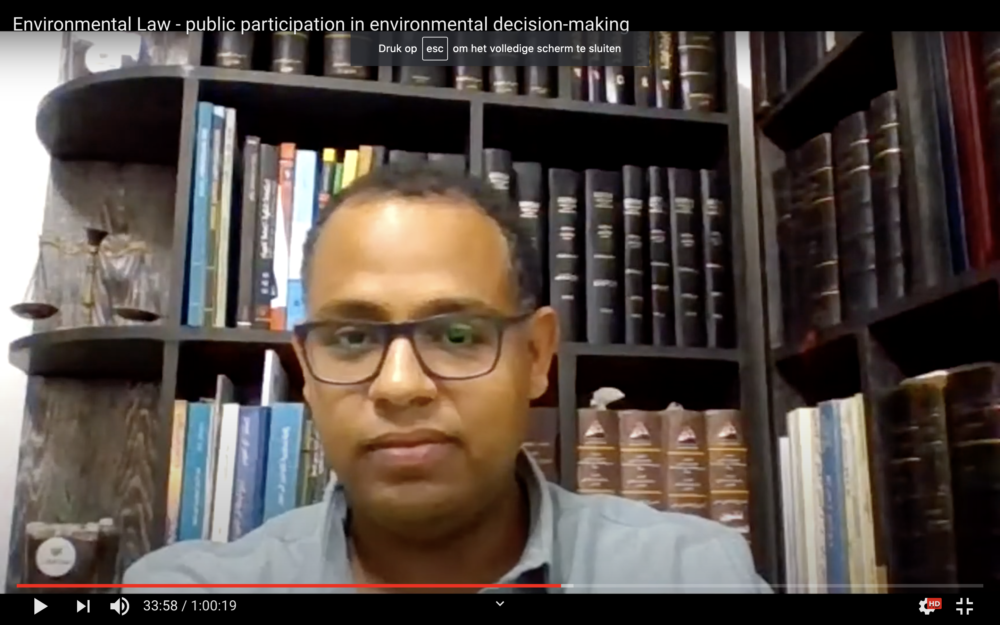
Ahmed Elseidi
Environmental legislation in the Middle East and North Africa: from a palliative to a participation tool?
Ahmed Elseidi is an environmental lawyer. In fact, he is the only environmental lawyer in Egypt, and he runs the only law firm that specializes in environmental law in the whole of North Africa. ElSeidi is a serious man with a calm voice and he never tires of explaining.
He began his work in this field as a volunteer for the Habi Center for Environmental Rights when it filed a lawsuit at the Egyptian Administrative Court challenging the use of coal by two cement companies. The Habi Center claimed that the companies had failed to disclose the required environmental impact assessment studies on public hearings, before they started using coal in their operations. It also claimed that by using coal without adhering to the relevant regulations, the companies were violating citizens’ rights to health, a healthy environment, participation and access to information, as enshrined in the Egyptian Constitution.
 Egyptian coal plant
Egyptian coal plant
This was in 2016. When the Habi Center closed after the owners’ demise in 2018, Elseidi established his own law firm, the Elseidi Law Firm, and took over the case. We spoke with Elseidi via zoom, as we are interested to learn more about the his persistent efforts. “We have a research unit and a legal unit”, explains Elseidi, “and we are currently working on three cases. The biggest one still is the one with the cement companies. ” A central issue in the case is the air pollution caused by the two cement companies, and the way they have dealt with environmental impact assessments. The other cases deal with the price for drinking water and with climate change and the obligation of the authorities in Alexandria to respect nationally subscribed climate change regulations.
Environmental law in Egypt
Modern environmental legislation originated in the sixties. It was part of a promise to make societies more honest, just and democratic. However, environmental law is no magic wand. When an environmental treaty is signed, or a nature protection law is adopted, environmental problems do not automatically disappear. The laws provide ways for citizens to take action against climate change and other environmental problems. The laws are tools to address these problems in a fair manner.
“Basically”, says Elseidi, “environmental laws are the laws that provide citizens with the right to obtain usage of natural resources, and the right to participate in the management of these resources. Environmental laws also guarantee citizens’ access to information about these resources.” According to international climate agreements, it is of great importance that the public partakes of every level of decision-making when it comes to climate-related issues. Therefore, it is crucial that the public has access to information related to climate change.
At the same time, Elseidi emphasizes it is every individual’s task and responsibility to look after the environment. “We all face the same environmental threats and dangers. It certainly is not simply the task of lawyers and policymakers!”
Climate justice and protection of the environment have become a big topic in Egypt. Environmental NGOs in the country are, however, hardly aware of the fact that the law can help them reach their objectives. They do not know about the strong legal tools for public participation, and that, in theory, one single person can stop the development of a project if it has a negative impact on the environment. “Many environmental and nature protection organizations are focusing all their efforts on awareness raising and change of behavior”, says Elseidi. What he would like them to do is take the next step, which is to use legal structures to address environmental problems.
 The great pyramids of Gizeh through the smog
The great pyramids of Gizeh through the smog
Elseidi is specifically referring to situations where big projects (such as factories that produce gas, cement, or petroleum) are being developed. According to the law in Egypt (but also in countries like Jordan, Kuwait, the UAE) any company or governmental organisation that is planning a project, has to make an assessment of the environmental impact of that project. Under Egyptian law, a project developer is obliged to conduct two rounds of consultations with local communities. During public hearings, communities must be informed by experts and researchers about the environmental impact of the project. Environmental impact assessment studies must be made public, and citizens should be given the opportunity to raise questions and objections, after which project developers should address these environmental concerns. This right to information and involvement of citizens applies not only before the start of the project, but throughout its implementation. Of course, this requires much more effective dissemination about impact studies and widespread announcements of public hearings from the side of industrial project owners and authorities.
Egypt is not the only country in the MENA where environmental legislation is insufficiently applied or enforced. This is the case throughout the region. In some cases, authorities have signed international environmental agreements, but they lack the capacity or means necessary to align local laws with these agreements.
In some countries, environmental laws are weak and do not offer protection against environmental crimes. Unlike in Egypt, NGO activism in these countries is therefore targeting policy levels, to improve environmental legislation. In a country like Lebanon, environmental organizations are sometimes denied insight into environmental impact assessments by companies hiding behind ‘intellectual property’ claims. In doing so, these companies are depriving citizens of their right to transparency.
Environmental NGOs, activists and researchers in MENA countries are facing major challenges. It is crucial that they are supported by solid environmental legislation, and, as Elseidi keeps emphasizing, “that they are familiar with their rights as citizens.” Networking and exchange of knowledge between NGOs and environmental lawmakers can help their case.
On 3 November 2020, Ahmed Elseidi gave a presentation in Arabic about his work during a recorded zoom meeting. Watch the complete session here.
Share this post via